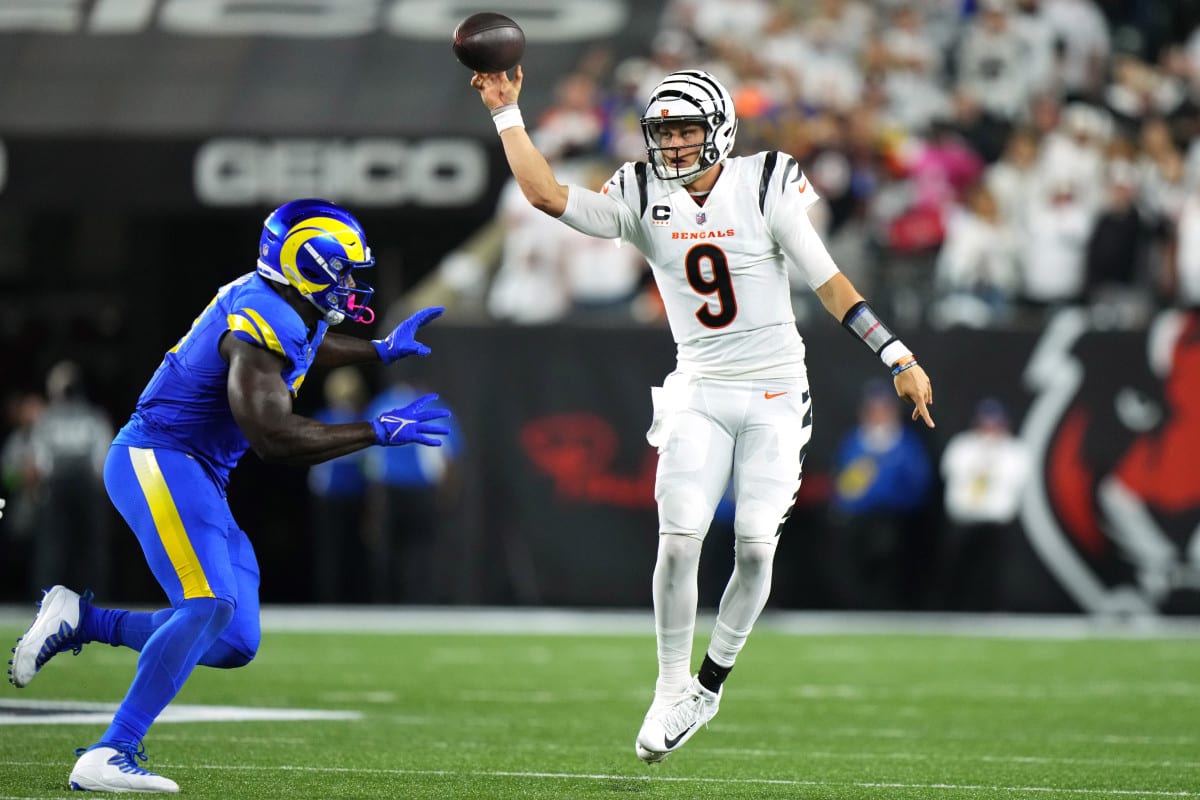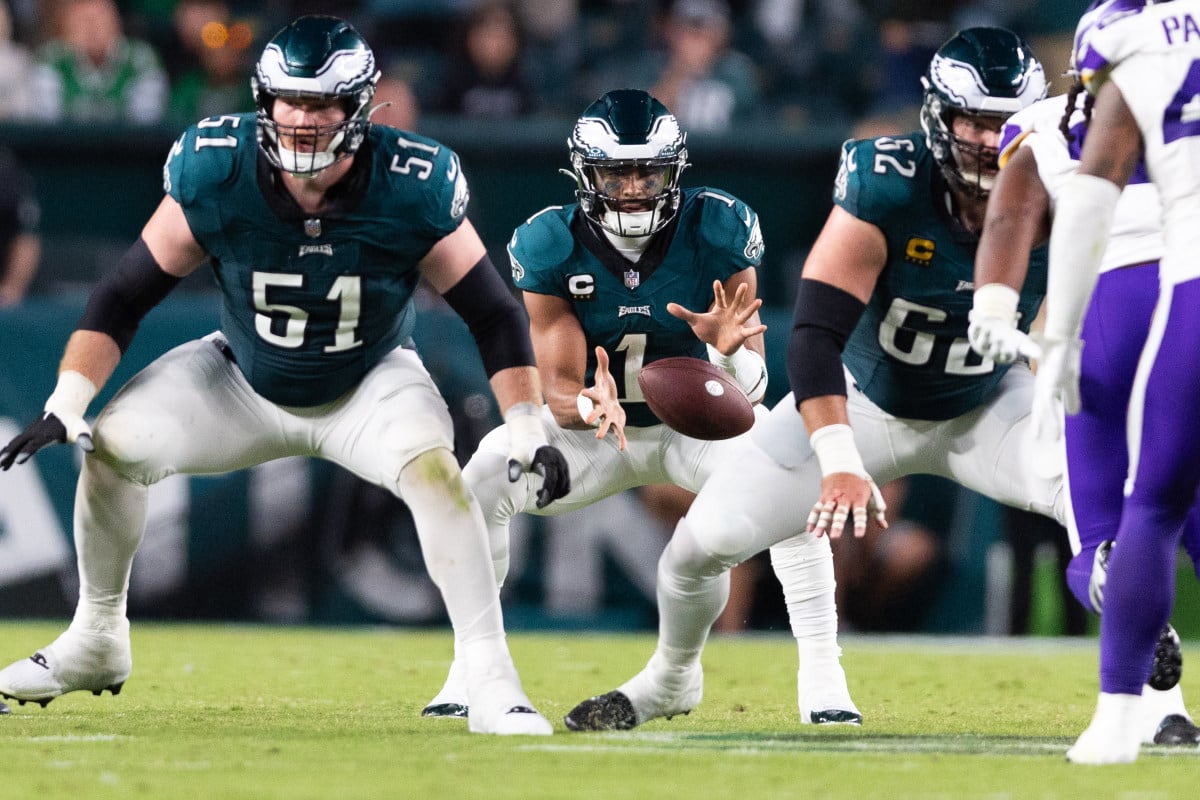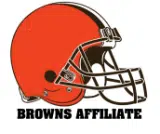Tuesday Notes are here, and Week 4 is just two days away …
• There’s one thing that Joe Burrow said postgame Monday that you should pay close attention to, if you care about where the Bengals are going in 2023.
“We’re getting there,” he said, on the state of his strained calf. “Every week will be better as long as there’s no more setbacks.”
This is exactly where the Cincinnati staff is, and has been, on Burrow’s return from a calf injury. It was easy for everyone, back in July and August, to say that the quarterback has always been a quick healer and that this situation would be no different. There’s a reason they were careful not to: This injury actually is different.

Kareem Elgazzar/USA TODAY Sports
It’s the first significant soft-tissue injury Burrow has had as a pro, so how fast he came back from a torn ACL or (certainly) appendicitis really doesn’t apply much here. You could argue it’s actually completely irrelevant to this injury.
Soft-tissue injuries need treatment. They can linger. There’s risk of reinjury. So that’s what Burrow and the Bengals are working through.
The good news is—while Burrow is still having trouble stepping into throws consistently the way he would if he were healthy—there were a few moments in the third quarter of Monday’s win against the Rams when the quarterback looked like his Pro Bowl self.
There was an out-cut he threw to Ja’Marr Chase from a pressed, closed-in pocket with 9:20 left that had juice on it. There was the throw Burrow spun to Chase on third down into a tiny window, which the receiver had to reach back for, with the interior rush in his lap a few plays later. And then, on the following drive, there was the designed play-action rollout (it looked like a shotgun bootleg call) that led Burrow to find Chase downfield for 43 yards.
With the Titans and Cardinals up next—teams that have played tough but are in some sort of transition period with their rosters—the Bengals should be able to manage Burrow a bit the next couple of weeks and still get to 3–2. And from there, if you get a full-speed Burrow around mid-October, then you could really start to see the quarterback and his team go to work.
Also, while we’re here, it’d be wrong not to point out Burrow’s toughness in gutting this out. It’s something Bengals coach Zac Taylor has made a point of raising too, and it’s always been a part of who the little brother of a couple of old Nebraska linebackers is.
• In this week’s takeaways we mentioned how impressive C.J. Stroud has been through three weeks. The Texans rookie, to me, at this very early juncture, has been the best of the three first-round quarterbacks. And that’s especially when you consider that he’s been playing without four (!) starting offensive linemen.
So what best illustrates it?
Coach DeMeco Ryans insisted to me Sunday night that, rather than the big plays to fellow rookie Tank Dell, or Stroud’s statistical line, it was in a couple of specific spots you might’ve missed.
“His special plays to me? We know they’re going to be a blitz-heavy team,” Ryans said, of going into the game with the Jaguars. “The special plays to me aren’t the big deep passes to Tank. The plays to me are when he’s getting blitzed, getting to his answer on the hot throws. That’s where he needed to improve. That’s what he did. He made smart decisions with the football. That’s what’s impressive to me.”
To bring that to life, I asked around Monday to dig up a couple of examples that the Texans were most impressed with. And there were two, in particular, that you could say added up to a four-point difference—where a field goal legitimately became a touchdown. The instances came three plays apart, early in the second quarter of Houston’s 37–17 win in Jacksonville.
The first one was on third-and-5, with 9:56 left in the first half from the Jaguars’ 19-yard line. At the snap, there were six Jacksonville players crowded at the line. All of them came, and nickel Tre Herndon did, too, out of the slot. That gave the Texans seven rushers to block, with only six guys in to protect Stroud (the five linemen and running back Mike Boone).
Stroud took the shotgun snap, made a couple of shuffle steps, assessed the rush and got the ball out as soon as he planted his back foot. He threw to Dell, underneath, right in the area that Jacksonville’s linebackers had vacated. Dell easily collected the ball just short of the sticks, turned and picked up the first down for a seven-yard gain.
Then, on the ensuing third-and-2 from the 4-yard line, the Jaguars showed a standard four-man pressure presnap. But at the snap, linebacker Foyesade Oluokun came off the right edge, and safety Rayshawn Jenkins came off the left—which meant six rushers were coming at a five-man protection. Stroud calmly looked down the barrel of the gun, recognizing the blitz and going to tight end Brevin Jordan. (Jenkins had been lined up over Jordan in the slot, and Stroud released the ball high to get it over the safety’s outstretched hands.)
Stroud got it out to Jordan fast enough so (a) the blitz couldn’t get to him, and (b) safety Andre Cisco couldn’t get to the tight end before the ball got there.
This, of course, doesn’t make Stroud All-Pro or anything like that. But these are awfully good signs for a quarterback making his third NFL start.
• We wrote last week about how the Eagles’ pass offense looks a little wonky and how the defense needs some work at linebacker and safety, positions where they lost vets in the offseason.
Yet, the Eagles are 3–0.
Yet, the Eagles outgained the Bucs 472–174 in Tampa Bay on Monday.
Yet, Philadelphia has spent one possession (and 7:55) playing from behind through three games.
So how do you match a team that hasn’t always looked quite right this year with that sort of game control and statistical dominance? It’s really easy. And a great lesson in where Philly is most invested and why it has invested there.
Nick Sirianni’s team is in position to work out its issues on the fly, simply put, because its ability to control the line of scrimmage across the board is second to none. If you’re as good as the Eagles are on the lines, you’re gonna be in every game and you’re probably going to win most. It allows you to control the clock and the pace of the game on offense, and take the other team off its game while on defense. Plus game whatever problems you have elsewhere.
So here, according to Spotrac’s number, is the team’s overall cap investment in its offensive and defensive lines: $82.73 million (if you add Haason Reddick, a line-of-scrimmage player classified as a linebacker, the number jumps to $89.94 million). That’s 36% of the salary cap, and it’s a number that’s kept lower with Cam Jurgens, Landon Dickerson, Tyler Steen, Jalen Carter and Jordan Davis still on rookie contracts.

Bill Streicher/USA TODAY Sports
The Eagles are one of just four teams that are top 10 in the NFL in both offensive and defensive line cap spending, joined by only the Bengals, Falcons and Colts. And in both position groups, they have a pair of 10-year vets to bring the younger guys along (Jason Kelce and Lane Johnson on offense, Fletcher Cox and Brandon Graham on defense).
We talk a lot, really all year, about blueprints for building teams. More should take a page from the one that Howie Roseman and the Eagles have drawn up.
• The J.C. Jackson situation provides a good example of the buyer beware nature of free agency, and really in two ways.
The first, of course, is the fact that someone let the free agent hit the market in the first place, and digging out that reason should always be an important piece of the process. In the case of Jackson, there were questions about his maturity and reliability, questions that went back to the former Maryland star’s fall in the 2018 draft, and that the Patriots considered when seriously limiting how far they were really willing to go to keep him.
Second is the fact that if a guy has issues while he’s playing on a relatively modest rookie contract, those problems probably won’t go away with bigger checks. As my old buddy Troy Brown used to say on the shows I’d do with him, “Money only makes you more of what you already are.”
So it was, then, that Jackson was a healthy scratch Sunday, and that there’s an arrest warrant out for the sixth-year corner in Massachusetts. And so it is that the Chargers feel the way the Patriots once did—that it’d be hard to really count on Jackson.
• For what it’s worth, the Cardinals certainly had more success going after DaRon Bland, who’s replacing Trevon Diggs at outside corner for the Cowboys, than they did Stephon Gilmore during Sunday’s upset win in Glendale, Ariz.
Probably a good indicator, too, that teams, starting with New England this week, will test Bland—until he proves he can hold up in Dan Quinn’s system, which leans on its corners who are playing a lot of match/carry coverage. The good news is that Bland flashed a bunch last year, played well in the slot before Diggs went down and has good physical ability.
• I was interested, on Sunday, to ask Raheem Mostert what he sees as the difference between the Mike McDaniel he had with the 49ers and the version he’s got with the Dolphins.
So San Francisco Mike vs. Miami Mike?
“I mean, San Francisco Mike, he was more so the one that was behind the screen, that was drawing the plays up,” said Mostert, who was with McDaniel for four years with the Niners. “Obviously, Miami Mike, he’s definitely taken on the role as the head coach, something that he wasn’t being seen as down in San Francisco. So for him to take this approach and doing what he’s doing, I mean, I just, you can’t be any more proud of the growth and the type of person that he is.”
• De’Von Achane was the breakout star in Miami’s name-your-score performance on offense Sunday, with 203 yards and two touchdowns on 18 carries.
There’s plenty for Dolphins fans to be excited about there. What I’m interested in seeing from the 5’8″, 188-pound running back is how he comes out of it and how much the coaches give him this week against the Bills. Everyone knew going into the draft how explosive a playmaker Achane was. The question was, with his slight frame, how he’d hold up.
• In the wake of Mike Williams’s injury, what the Chargers will get from first-round pick Quentin Johnston has gone from a bonus to, well, vital to where they’re going. In the team’s first three games, the TCU product has played 22, 10 and 16 snaps, and came away from those games with five catches and 26 yards.
The good news is that, stylistically, the bigger-bodied Johnston isn’t unlike Williams, so it won’t be hard for the staff to find him a role alongside Keenan Allen and Josh Palmer.
• The work of the Seahawks in the run game Sunday shouldn’t go unnoticed. They went for 146 yards on 33 carries and, notably, were able to balance the work of returning star Kenneth Walker III and rookie Zach Charbonnet.
It was fair to ask questions about the Seahawks after their season-opening loss to the Rams. But they’ve bounced back since, and look like they are, to borrow a phrase, who we thought they were.
• We’re getting a good one Thursday, and the Packers have two big hamstring injuries to track, with both Christian Watson and Aaron Jones. Green Bay was able to weather the storm without those two against the Saints. It’ll be tough to do that again in a short week.



















